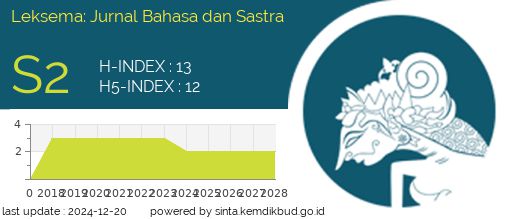THE REPRESENTATION OF ORIENTALISM NEGOTIATION IN ROWELL'S ELEANOR AND PARK
DOI:
https://doi.org/10.22515/ljbs.v8i1.6127Keywords:
negotiation, orientalism, racism, representationAbstract
This paper explores the representation of orientalism negotiation in a novel entitled Eleanor and Park, written by Rainbow Rowell. This study utilized a descriptive-qualitative method to analyze the story by applying the representation theory proposed by Stuart Hall, especially the constructive approach suggested by Foucault. It focuses on the construction of meaning through language related to the depiction of oriental characters and how they struggle and respond to the treatments they receive from white people. Operating the concepts of orientalism from Edward Said and the discursive approach proposed by Foucault, this study explores the ideological position of the writer as well. From this study, it is found that as an American white writer, Rowell shows the negotiation of the orientalism concept. Presenting the white characters with oriental characteristics and non-white characters with accidental qualities, Rowell exemplifies the strategic way to create racial harmony. However, the efforts to create characterizations as forms of negotiation against orientalism have reached a dead end because the readers are more impressed by the honored class, which consists of mostly white students, who are able to subvert the negotiations on orientalism made by the author.
Downloads
References
Bhattacharya, Rima. 2019. “Neo-Orientalist Stereotyping in Amy Tan’s the Hundred Secret Senses.” Journal of Language, Literature and Culture 66 (1): 31–45. https://doi.org/10.1080/20512856.2019.1595478.
Brouillette, Sarah. 2011. “On the Entrepreneurial Ethos in Aravind Adiga’s The White Tiger.” In Lisa Lau and Ana Cristina Mendes (eds.) Re-Orientalism and South Asian Identity Politics 50. New York: Routledge. https://doi.org/10.4324/9780203814543.
Compagno, Dario. 2012. “Theories of Authorship and Intention in the Twentieth Century: An Overview.” Journal of Early Modern Studies 1 (0): 37–53.
Ellisa, Fabiana Dindavika. 2018. Finding Self Identity through the Main Characters and Setting in Rowell's Eleanor and Park (Graduate Thesis). Yogyakarta: Sanata Dharma University.
Foucault, Michel. 1981. “The Order of Discourse.” In Robert Young (ed.) Untying the Text: A Post-Structuralist Reader. First, 51–78. Boston, London and Henley: Routledge & Kegan Paul Ltd.
Gershman, Kathleen. 1988. “Given to Theatrics: How to Agree with Your Critic on the Qualities of Qualitative Research.” International Journal of Qualitative Studies in Education 2 (1): 41–43. https://doi.org/10.1080/0951839890020104.
Hall, Stuart. 1997. Representation: Cultural Representations and Signifying Practices. Thousand Oaks: Sage Publication Ltd.
Haqan, Arina. 2011. “Orientalisme dan Islam dalam Pergulatan Sejarah”. Mutawatir: Jurnal Keilmuan Tafsir Hadis 1 (2). https://doi.org/10.15642/mutawatir.2011.1.2.155-167.
Jebaselvi, M and MV Sivakumar. 2021. “Social Challenges of Young Adults in Rainbow Rowell’s Eleanor and Park.’” International Journal of Linguistics and Computational Applications 7 (4): 24–29. https://doi.org/10.30726/ijlca/v7.i4.2020.74006.
Kasiyan. 2003. Perspektif Posmodern dan Poskolonial dalam Dialaektika Kajian Pluralitas Seni dan Budaya Global. Yogyakarta: Jurusan Seni Rupa FPBS UNY.
Lary, Diana. 2006. “Edward Said : Orientalism and Occidentalism.” Journal of the Canadian Historical Association 17 (2): 3–15. https://doi.org/https://doi.org/10.7202/016587ar.
Molina-Guzmán, Isabel. 2016. “#OscarsSoWhite: How Stuart Hall Explains Why Nothing Changes in Hollywood and Everything Is Changing.” Critical Studies in Media Communication 33 (5): 438–54. https://doi.org/10.1080/15295036.2016.1227864.
Perkins, Miriam Y. 2019. “The Praxis of Prophetic Voice : Martin Luther King , Jr . and Strategies for Resistance” 17 (3): 241–57. https://doi.org/10.1080/14769948.2019.1688089.
Puteri, Violyta Radina, Ayu Oktaviani, and Dewi Syafitri. 2020. “An Analysis of Social Conflict in Eleanor and Park Novel By Rainbow Rowell.” JELLT (Journal of English Language and Language Teaching) 4 (2): 25–34. https://doi.org/10.36597/jellt.v4i2.9458.
Said, Edward. 1979. Orientalism. New York: Random House, Inc.
Said, Edward W. 2003. Orientalism (Reprinted). New York: Penguin Books.
Santoso, Budi. 2017. “Bahasa dan Identitas Budaya”. Sabda: Jurnal Kajian Kebudayaan 1 (1): 44-49. https://doi.org/10.14710/sabda.1.1.44-49.
Seeger, Sean. 2017. “Martin Amis, Neo-Orientalism, and Hubris.” Postcolonial Studies 20 (4): 494–509. https://doi.org/10.1080/13688790.2017.1406792.
Widjajati, Ghassani Auliannisa, Ikwan Setiawan, and Supiastutik Supiastutik. 2022. “An Analysis on The Construction of Orientalism in Dan Brown’s Digital Fortress.” Haluan Sastra Budaya 6 (1): 69–96. https://jurnal.uns.ac.id/hsb/article/view/57158/35942.
Zeng, Kui. 2021. “Orientalism in D. H. Lawrence’s Novelistic Representation of Italy.” Journal of Language, Literature and Culture 68 (1): 1–9. https://doi.org/10.1080/20512856.2021.1882024.
Zulfatirahmi, Syarifah. 2018. Representasi Eksotisme dalam Pemberitaan Destinasi Wisata Indonesia (Undergraduate Thesis). Yogyakarta: Universitas Islam Indonesia. https://dspace.uii.ac.id/handle/123456789/10117.
Downloads
Published
Issue
Section
License
Copyright (c) 2023 Leksema: Jurnal Bahasa dan Sastra

This work is licensed under a Creative Commons Attribution-NonCommercial-ShareAlike 4.0 International License.
The copyright of the received article shall be assigned to the publisher of the journal. The intended copyright includes the right to publish the article in various forms (including reprints). The journal maintains the publishing rights to published articles.
In line with the license, the authors and users (readers or other researchers) are allowed to share and adapt the material only for non-commercial purposes. In addition, the material must be given appropriate credit, provided with a link to the license, and indicated if changes were made. If authors remix, transform or build upon the material, authors must distribute their contributions under the same license as the original.







